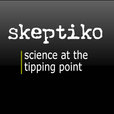
Summary: Interview with philosopher and noted atheist Dr. Stephen Law examines the philosophy of science and extraordinary claims. Join Skeptiko host Alex Tsakiris for an interview with Dr. Stephen Law author of, Believing Bullshit: How Not to Get Sucked into an Intellectual Black Hole. During the interview Law talks about how science measures extraordinary claims: Alex Tsakiris: This idea of extraordinary claims requiring extraordinary proof, you want to talk about sweeping mystery, sweeping evidence that you don’t like under the rug, here is the mantra for the Centre for Inquiry crowd. I see that as an intellectually feeble pronouncement -- extraordinary claims require extraordinary proof—that is anti-science, isn’t it? Dr. Stephen Law: Why do you think that? Alex Tsakiris: We’ve built this whole institution of science, the whole process of peer-review, the whole process of self-correction around this idea that we will altogether discover what is real, what is not real, what is extraordinary, what is not extraordinary. So the idea that after the fact, after the results come in, we say, “You know, those are pretty interesting results but I deem that to be extraordinary; therefore, you’ll need an extra level of proof on that.” I think it’s just silly. Dr. Stephen Law: Okay, I think I see where you’re coming from. The way I’ve understood that principle, extraordinary claims require extraordinary evidence, says that suppose I tell you that over there, I’ve got a mobile phone and a cup, okay, and I do this, there’s the mobile phone and the cup. You’re going to go, “Hey, yeah, that’s good enough for me.” Steve’s got a mobile phone and a cup. If I now wield out a fairy which I make dance on the end of my finger and go, “There you go, a fairy on the end of my finger,” you’re going to go, “Yeah, Steve’s got a fairy on the end of his finger. Fair enough. I’ll accept that on the basis of the same kind of evidence that I accepted he’s got a cup with a mobile phone.” I bet you would not. Alex Tsakiris: Sure, but we’re talking about science here. We’re talking about peer-review. The example I sent you and I have personal experience with, because he told it to me on this show, is British psychologist and parapsychology critic, Richard Wiseman. He has investigated probably more of these paranormal parapsychology claims, like telepathy, than anybody else. Here’s his quote: “I agree that by the standards of any other area of science that remote viewing (and he later added in this quote, ESP) is proven. But that begs the question: do we need higher standards of evidence when we study the paranormal?” So Stephen, this is not a fairy in the cup. This is a guy who has reviewed hundreds of peer-reviewed papers and is saying, You know what? It’s good enough for any other field of science but not good enough here because of the ground-breaking upset it would make for science. This is the best evidence I could give you for my claim about scientific materialism being woven into science as we know it. Dr. Stephen Law: I think if I stick my finger out there and it appears to be a finger with a fairy spinning around on the end of it, you’re going to be very, very suspicious. You’re not just going to say, “Yeah, Stephen’s proved to me that there are fairies.” You’re going to require much more investigation before you take my word for it that there really is a fairy spinning around on the end of my finger. Why is that? It’s because the prior probability of anything like a fairy exists is very, very low indeed, knowing what we do. (continued below) Dr. Stehpen Law's Blog Play It Listen Now: Download MP3 (64 min.) Read It: Alex Tsakiris: Let me, in that spirit, return to your book, Believing Bullshit, with another quote that I liked: “The more we appeal to mystery to get ourselves out of intellectual trouble, the more we use it as a carpet under which to sweep inconvenient truths or discoveries,
